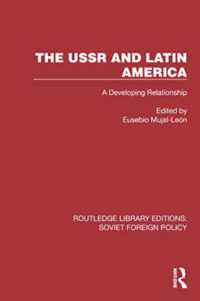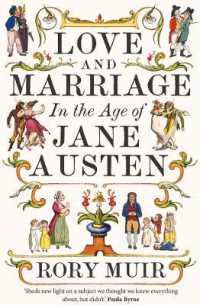- ホーム
- > 洋書
- > 英文書
- > Literary Criticism
Full Description
This book offers the first comprehensive close reading in any language of the complete works of Charles Baudelaire (1821-1867). Taking full account of his critical writings on literature and the fine arts, it provides fresh readings of Les Fleurs du Mal and Le Spleen de Paris. It situates these works within the context of nineteenth-century French literature and culture and reassesses Baudelaire's reputation as the 'father' of modern poetry. Whereas he is traditionally considered to have rejected the public role of the writer as moralist, educator, and political leader and to have dedicated himself instead to the exclusive pursuit of beauty in art, this book contends not only that he rejected Art for Art's sake but that he saw in 'beauty'--defined not as an inherent quality but as an effect of harmony and rich conjecture--an alternative ethos with which to resist the tyrannies of ideology and conformism.
Contrarian in his thinking and provocatively innovative in his poetic practice, Baudelaire fell foul of the law when six poems in Les Fleurs du Mal (1857) were banned for obscenity. In the second edition (1861), substantially recast and enlarged, the poet as alternative lawgiver made plainer still his resistance to the orthodoxies of his day. In a series of major critical articles he proclaimed the 'government of the imagination', while from 1855 until his death he developed an alternative literary form, the prose poem--a thing of beauty and an invitation to imagine the world afresh, to make our own rules.
Contents
Preface
Introduction: An Unacknowledged Legislator?
PART I RESISTANCE
1: The Poet of Resistance
2: The Poet-Artist as Double Agent
3: The Poet-Artist as Performer
PART II MELANCHOLY
4: Melancholy and Baudelaire
5: Melancholy and Satan
6: Lesbos and Limbo: Towards Les Fleurs du Mal
7: The Beauty of Ill-Being: From Sappho to Satan
8: Les Fleurs du Mal (1857/1861): New Beginnings
9: Les Fleurs du Mal (1857/1861): New Endings
10: Melancholy and the Poetic Act: Decomposition and Composition
PART III IMAGINATION
11: Imagination and Resistance: The Case of Poe
12: The Government of the Imagination: The Salon de 1859
13: Imagination and Conjecture: Gautier and Hugo
14: Imagination and Suggestion: Wagner, Guys, Delacroix
PART IV POETRY IN VERSE
15: The Poetry of Passion: Sex, Beauty, and Verse
16: The Performance of Melancholy: The Duel and the Waltz
17: Versification and the Poetic Idea
18: Poetry in the City: Melancholy and Time in 'Tableaux parisiens'
19: The Poet and the City: The Seer as Sightseer in 'Tableaux parisiens'
PART V PROSE POETRY
20: The Inauguration of the Prose Poem
21: Prose Poetry and the Press: The Poetics of Resistance
22: The Question of Intent: Mystification and Perplexity
23: The Voice of the Stranger: Reality and Imagination
24: The Poet in the World: Empathy and Performance
25: The Beauty of the Prose Poem
Conclusion: Beauty and the Poet as Alternative Lawgiver








